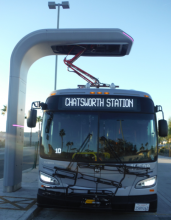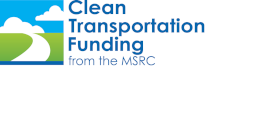
The Los Angeles County Metropolitan Transportation Authority’s (Metro) Orange Line Fleet Electrification Project is continuing to bring cleaner air to residents in the North San Fernando Valley. The MSRC provided $2 million in Clean Transportation Funding to Metro to help purchase 40 new 60-ft zero-emission New Flyer buses to help the agency fully transition its Orange Line to using only electric buses.
The Orange Line first opened in 2005 and expanded in 2012 operating compressed natural gas (CNG) buses. The line is an 18-mile Bus Rapid Transit route running on a dedicated right-of-way with 18 stations between North Hollywood and Chatsworth in Los Angeles County. In 2017, the Metro Board directed staff to convert the entire Orange Line fleet to zero-emission operations by 2020. In 2019, Metro requested a grant from the MSRC to help meet this goal. “Metro applied for MSRC funding to support the acquisition of these zero-emission vehicles - funding which is crucial in advancing environmentally friendly initiatives and contributing to the overall improvement of air quality in the region,” said Daniel Surmenian, Senior Engineer in the Vehicle Engineering and Acquisition Division for Metro.
The first electric bus was deployed on the Orange Line in 2020. One year later, the Orange Line’s transition to an all-electric fleet was complete, becoming Metro’s first 100 percent zero-emission line, with 15-20 electric buses operating at any one time. To support these buses, four 450kW on-route chargers at the North Hollywood station, two 600kW chargers at the Canoga station, and two 600kW chargers at the Chatsworth station were installed. Additionally, 10 150kW depot chargers were installed at Division 8 headquarters. On-route charging takes less than one hour, but Metro typically doesn’t charge more than 15 minutes at a time due to service constraints. Depot charging takes two to three hours. The buses have an approximate 150-mile range without having to recharge.

As of April 2023, the Orange Line buses have accumulated more than 3.3 million miles, averaging 91 miles per bus per day. These electric buses produce zero tailpipe emissions and have reduced carbon dioxide emissions to approximately 4.6 million pounds during their tenure (from generating the electricity to fuel the buses), compared to 20 million pounds that would have been generated if the CNG buses had stayed on the road.
“The financial support from the MSRC is essential for implementing projects with upfront costs related to the adoption of environmentally friendly technologies,” Daniel noted. “This funding helps a transit agency, like Metro, achieve emissions reduction goals, comply with regulations, and positively impact the community and the environment by promoting sustainable transportation options.”
The Orange Line continues to deliver a smoother, quieter ride and cleaner air to four million riders and 114 disadvantaged communities along the route. Metro plans to convert its entire bus fleet to electric by 2030.
